Sweden's Most Powerful Supercomputer Inaugurated at KTH
The fastest supercomputer in Sweden, an HPE Cray EX system called Dardel, was inaugurated at the KTH Royal Institute of Technology in Stockholm on the 23rd of August 2023.
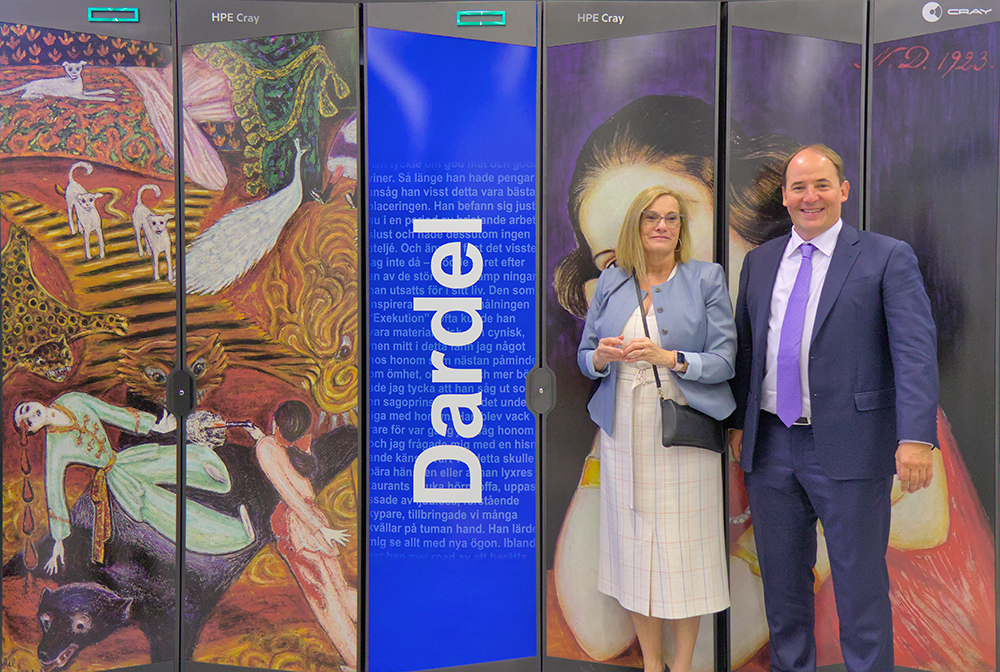
Dardel is one of the flagship supercomputers of the recently established National Academic Infrastructure for Supercomputing in Sweden (NAISS) and is hosted by the PDC Center for High Performance Computing at KTH. About 150 people attended the inauguration in person, while others participated via Zoom. NAISS and PDC were glad to welcome HPE and AMD (the companies that supplied Dardel and processors for the system, respectively), as well as representatives from other high-performance computing (HPC) centres and organisations, including attendees who travelled from other European countries, the USA and further afield in Sweden. It was great for there to be such a turnout from the HPC research community in Sweden, including researchers from various companies and academic institutions.
The inauguration program was hosted by Patrick Norman (Director of PDC), and included speeches by Anders Söderholm (President of KTH), Gert Svensson (Deputy Director of PDC), Jan-Eric Sundgren (Chairman of the NAISS Steering Committee), Katarina Bjelke (Director General of the Swedish Research Council), Trish Damkroger (a Senior Vice President from HPE), Jay Kirkland (Corporate Vice President for Platform Solutions Engineering from AMD) and Niklas Melin (Head of Simulation Enablement at Scania). In addition, there were tours of the PDC computer hall, and three of the research codes that are developed at PDC – GROMACS, Neko and VeloxChem – were presented by Erik Lindahl, Niclas Jansson and Patrick Norman, respectively. The event concluded with Ingemar Lindahl and Teresa Wennberg giving presentations (including a fascinating video) about Nils and Thora Dardel, in honour of whom the Dardel system is named.
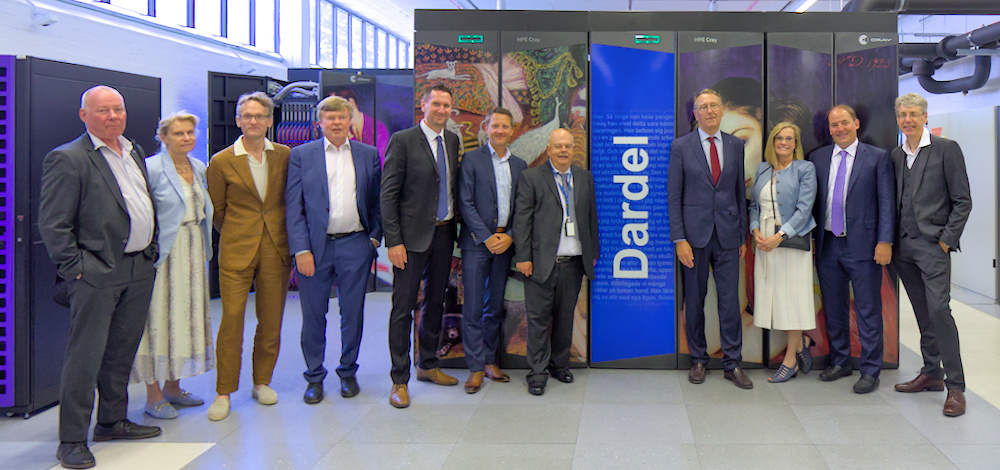
The Dardel system has two partitions: the GPU partition, which is housed in one of the cabinets just behind the speakers in the photo above, features AMD Instinct™ MI250X GPUs and was the 5th most energy-efficient supercomputing system in the whole world, as noted in the June 2023 Green500 list . The GPU partition was 77th globally in terms of speed (see the June 2023 Top500 list ), while the CPU partition was in 153rd place in the Top500 list for June 2023 . The CPU partition is based on AMD EPYC™ processors, which are also utilised in the nodes of the GPU partition.
Katarina Bjelke, Director General of the Swedish Research Council, was one of the speakers during the inauguration and highlighted the importance and benefits of Dardel being the foremost supercomputer in Sweden.
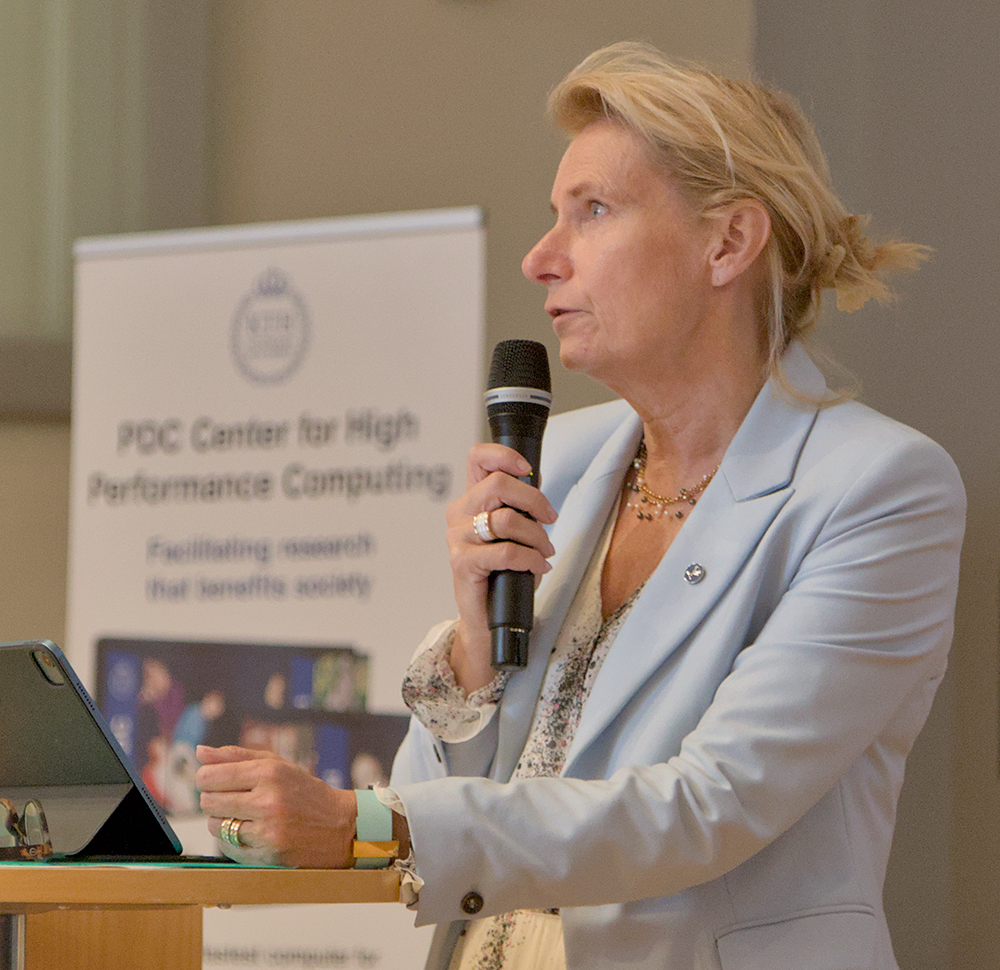
Swedish high-performance computing research is certainly going in the right direction: a group of researchers, led by Niclas Jansson at PDC, have been selected as finalists for the Gordon Bell Prize, which is regarded as the equivalent of the Nobel prize for computing. As Patrick Norman, Director of PDC, said at the inauguration:
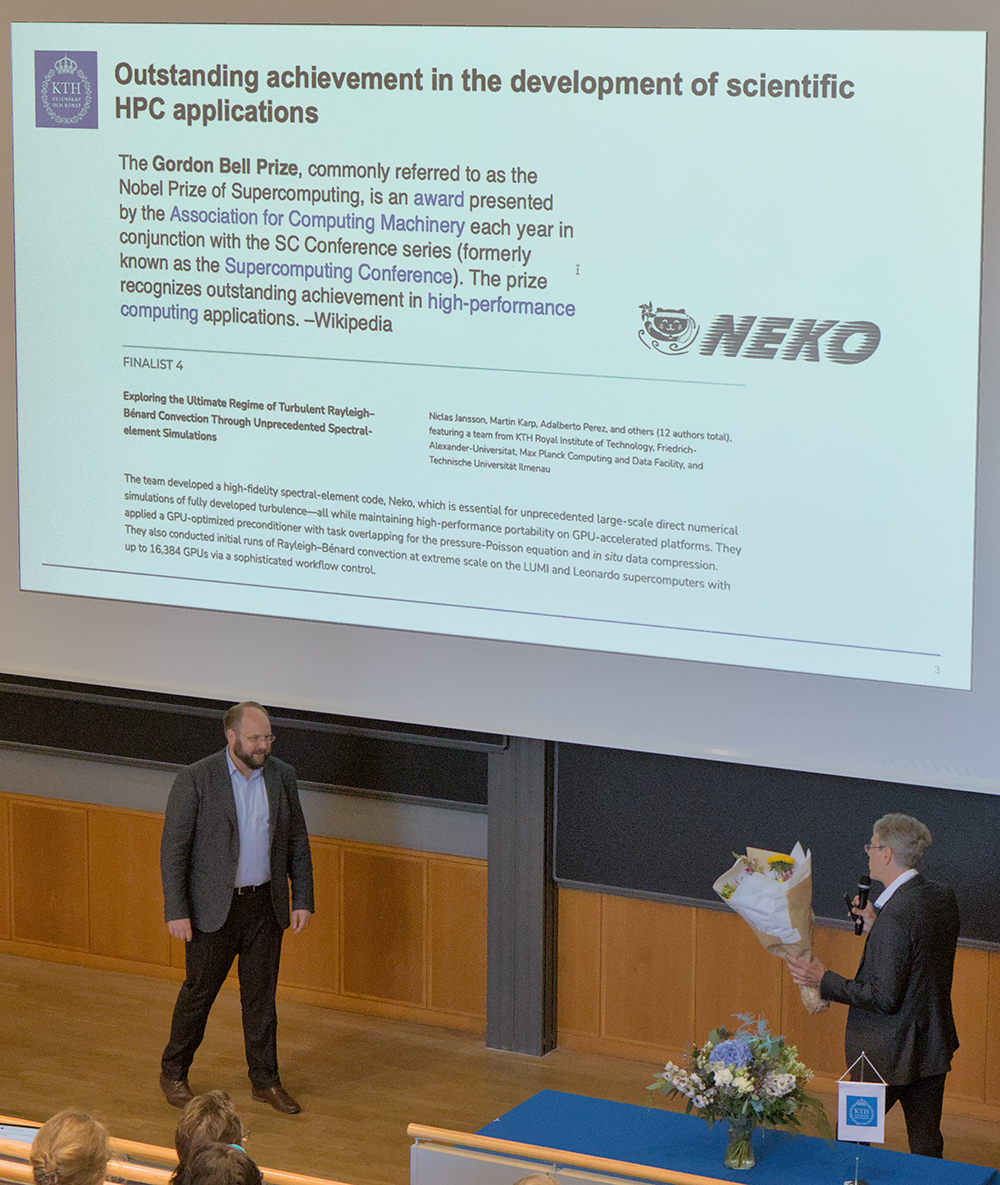
Trish Damkroger, a Senior Vice President from HPE, added her congratulations.
Jay Kirkland, Corporate Vice President for Platform Solutions Engineering from AMD, also commented on how impressive this achievement of the Neko development group is.
The Neko software is used for computational fluid dynamics simulations, which are essential, for example, in the development of greener vehicles, aircraft and sea-faring vessels, as well as for arranging arrays of wind generators so as to be maximally efficient. Neko is designed to make it easy to run these types of simulations on today’s massively parallel pre-exascale systems.
In addition to Neko, staff from PDC are involved in developing several other world-leading software applications for high-performance computing research, including GROMACS and Veloxchem. GROMACS supports simulations of biomolecular systems at varying levels and is one of the most widely used scientific software packages in the world, while VeloxChem is a quantum chemistry software application for calculating molecular properties and simulating spectroscopies. As Patrick Norman (Director of PDC) noted, KTH is “not only focusing on hardware and bare metal but also on companioning software for science and engineering applications”, which is vitally important these days as “having a supercomputer without proper applications is a little bit like having a synchrotron without beam lines”. The support KTH is providing so that PDC “can really do sustainable software development in the future” is therefore very important for future HPC research both in Sweden and globally, as the GROMACS, Neko and Veloxchem codes are all provided as open source.
Furthermore, KTH and PDC are making significant contributions to HPC research on a European level as PDC is leading three of the ten European Centres of Excellence (CoEs) that were awarded funding by the European High Performance Computing Joint Undertaking (EuroHPC JU) at the start of 2023: CEEC, BioExcel and Plasma-PEPSC. KTH and PDC are also partners in two other European CoEs: EXCELLERAT (which is another of the ten EuroHPC JU CoEs funded in 2023) and PerMedCoE (which is funded by the EU Horizon 2020 research and innovation programme).
Anders Söderholm, the president of KTH, noted that:
To support HPC research in Sweden and Europe, PDC/KTH is also collaborating with NAISS on a project to establish a mid-range supercomputer system (called Arrhenius) in Sweden in the near future. NAISS recently applied for a grant from EuroHPC to fund the system, and Patrick Norman, the Director of PDC, helped to author the application, which was approved very rapidly by EuroHPC. Jan-Eric Sundgren, Chairman of NAISS, explained about NAISS’ ongoing process to establish Arrhenius.
We are all looking forward to this new system, which will be beneficial for both academic and industrial research in Sweden by extending Sweden’s computational capacity for research by an order of magnitude. Meanwhile, PDC will continue with the developmental work on a range of software applications to make sure they can easily be ported from running on Dardel to the even more massively parallel and faster Arrhenius system.
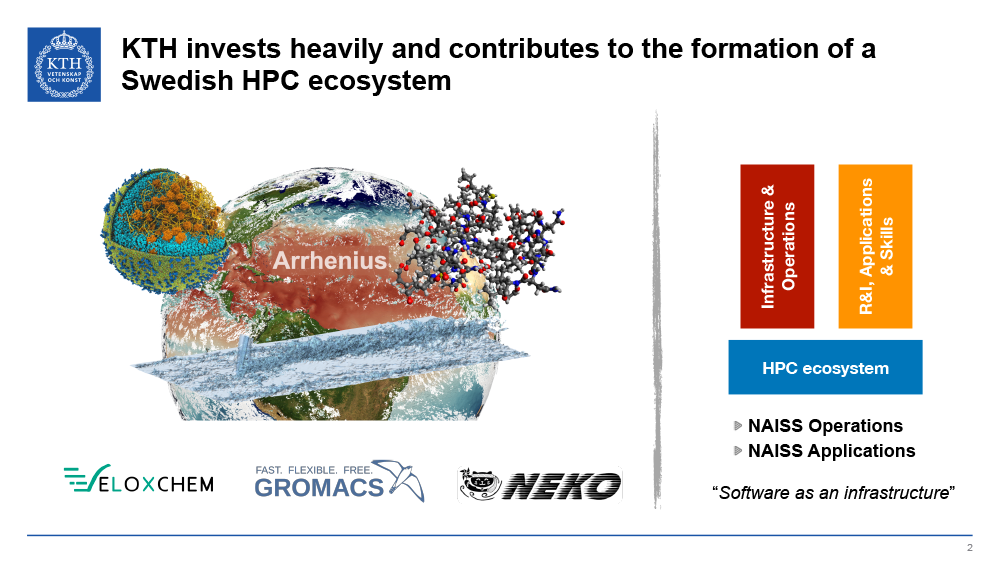
If you missed attending the Dardel Inauguration in person, you are welcome to catch up on the talks here.
- Inauguration speeches:
play.kth.se/media/Dardel+inauguration+-+part+1/0_z6p009hb - Presentations about GROMACS, Veloxchem and Neko:
play.kth.se/media/Dardel+inauguration+-+part+II/0_m3dwssh4
However, please note that, for copyright reasons, the talks and film about the lives of Thora and Nils Dardel are not included. Those of you who speak Swedish can also read more about the inauguration of Dardel in the articles below.
- sverigesradio.se/artikel/har-ar-kths-nya-superdator-snabbast-i-sverige (in Swedish)
- www.nyteknik.se/tech/nya-svenska-superdatorerna-ska-gora-avancerad-forskning-mojlig/4188863 (in Swedish)
- www.teknikaliteter.se/2023/10/03/tolv-petaflops-som-i-en-liten-ask (in Swedish).
Lastly, if you are interested in using Dardel for your academic or industrial research, please get in touch with PDC Support ( support@pdc.kth.se ).
